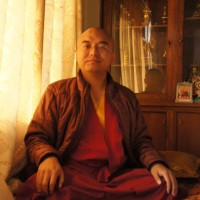Our lives are bounded by challenges of every conceivable variety. How do we deal with them? Typically we try either to deny or to eliminate them — treating them as enemies — or allow them to overwhelm us, treating them as “bosses.” A third option — the middle way exemplified by the hermit meditators of old — is to use our experiences as a means of opening to a deeper realization of our capacity for wisdom, kindness, and compassion. In Buddhist terms, this approach is often referred to as “taking your life on the path.” Your life, exactly as it is—right here, right now.
The radical goal of the Buddha’s treatment plan is not to solve or eliminate problems, but to use them as a basis or focus for recognizing our potential. Every thought, every emotion, and every physical sensation is an opportunity to turn our attention inward and become a little bit more familiar with the source. Many people look at meditation as an exercise, like going to the gym. “I’ve gotten that over with! Now I can go on with the rest of my life.” But meditation isn’t something separate from your life. It is your life. In a sense, we’re always meditating: focusing on emotional turmoil, disturbing thoughts, and drawing conclusions from our experiences about who and what we are and the nature of our environment. This sort of meditation often occurs spontaneously, without our conscious participation. Taking our lives on the path raises the process of unconscious meditation to a conscious level. Many people, including myself, embrace this approach in hopes of finding immediate solutions to mental and emotional pain. Of course, it’s possible to feel some sort of relief right away, but the experience usually doesn’t last very long. It’s not uncommon for people to become disappointed when the sense of freedom dissolves and to think “Oh, this Buddhist stuff doesn’t work.” But if we continue, beginning by just taking a few moments throughout the day to look at our experience and then perhaps extending our formal practice sessions, we discover that the Buddha’s treatment plan is much more than psychological aspirin. As we examine our thoughts, feelings, and sensations, we discover something precious.

Mingyur Rinpoche
from the book
Read a random quote or see all quotes by Mingyur Rinpoche.
Further quotes from the book Joyful Wisdom :
- The possibilities within us
- Embracing the conditions that trouble us
- Beginning to identify with pristine awareness
- Bringing an end to suffering
- No greater inspiration
- The right thing to do
- Looking directly
- Not alone
- Courage to be as we are
- A moment of direct pristine awareness
- Importance of understanding our basic situation
- Embracing the conditions that trouble us
- Ability to fly
- Clarity 24/7
- Essence of all our experiences
- Clarity
- Awareness and apprehended objects
- Samsara is an expression of nirvana
- Taking life on the path